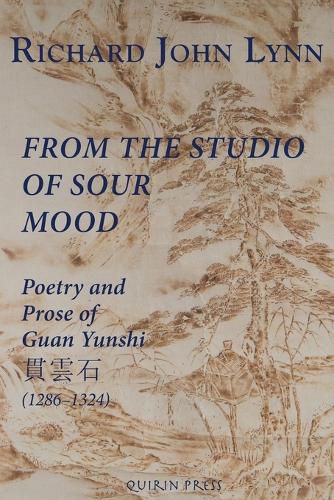Readings Newsletter
Become a Readings Member to make your shopping experience even easier.
Sign in or sign up for free!
You’re not far away from qualifying for FREE standard shipping within Australia
You’ve qualified for FREE standard shipping within Australia
The cart is loading…






This title is printed to order. This book may have been self-published. If so, we cannot guarantee the quality of the content. In the main most books will have gone through the editing process however some may not. We therefore suggest that you be aware of this before ordering this book. If in doubt check either the author or publisher’s details as we are unable to accept any returns unless they are faulty. Please contact us if you have any questions.
This is a study of one of the major literary figures of the period of Mongol rule in China, the Yuan dynasty (1260-1368).
From the Studio of Sour Mood: Poetry and Prose of Guan Yunshi ??? (1286-1324) is a radically rewritten and expanded version of Richard John Lynn's Kuan Yuen-Shih (Twayne's World Authors Series, Boston, 1980).
This QPUE edition offers the following features: - Older Wade-Giles transliteration fully updated and revised to Pinyin. - Fully re-typeset and proofed for typographical errors and inconsistencies. - Expanded index. - Fully revised and expanded by the author.
Keywords: Guan Yunshi ??? / Saevinc Qaya 1286-1324 Poets, Chinese - Biography Criticism and interpretation Translation and commentary
Guan Yunshi ??? (1286-1324), the Sinicized Uighur Saevinc Qaya, was a major literary figure of the Mongol-Yuan dynasty. During his own day, he enjoyed the highest of reputations as a writer of both classical verse and prose and the new popular form of lyric poetry, the free lyric (sanqu ??), which bridged "popular" and "elite" culture and literature. Guan is an interesting and unusual figure. Although not of major political or intellectual consequence, he was still close enough to the centre of trends and events to represent, in several important ways, the values and sensibilities of his age. Guan was also a major calligrapher, whose works were highly prized-some of which still survive. The transformation of this young Uighur military figure into, first, a Neo-Confucian Imperial academician in Dadu, the Yuan capital, and then, following disillusionment, a bon vivant and highly cultured semi-recluse in Qiantang (Hangzhou) makes a remarkable story, here amply illustrated with translations of all his surviving poetry and prose excerpts keyed to significant stages of his life.
For more details visit www.QuirinPress.com
$9.00 standard shipping within Australia
FREE standard shipping within Australia for orders over $100.00
Express & International shipping calculated at checkout
This title is printed to order. This book may have been self-published. If so, we cannot guarantee the quality of the content. In the main most books will have gone through the editing process however some may not. We therefore suggest that you be aware of this before ordering this book. If in doubt check either the author or publisher’s details as we are unable to accept any returns unless they are faulty. Please contact us if you have any questions.
This is a study of one of the major literary figures of the period of Mongol rule in China, the Yuan dynasty (1260-1368).
From the Studio of Sour Mood: Poetry and Prose of Guan Yunshi ??? (1286-1324) is a radically rewritten and expanded version of Richard John Lynn's Kuan Yuen-Shih (Twayne's World Authors Series, Boston, 1980).
This QPUE edition offers the following features: - Older Wade-Giles transliteration fully updated and revised to Pinyin. - Fully re-typeset and proofed for typographical errors and inconsistencies. - Expanded index. - Fully revised and expanded by the author.
Keywords: Guan Yunshi ??? / Saevinc Qaya 1286-1324 Poets, Chinese - Biography Criticism and interpretation Translation and commentary
Guan Yunshi ??? (1286-1324), the Sinicized Uighur Saevinc Qaya, was a major literary figure of the Mongol-Yuan dynasty. During his own day, he enjoyed the highest of reputations as a writer of both classical verse and prose and the new popular form of lyric poetry, the free lyric (sanqu ??), which bridged "popular" and "elite" culture and literature. Guan is an interesting and unusual figure. Although not of major political or intellectual consequence, he was still close enough to the centre of trends and events to represent, in several important ways, the values and sensibilities of his age. Guan was also a major calligrapher, whose works were highly prized-some of which still survive. The transformation of this young Uighur military figure into, first, a Neo-Confucian Imperial academician in Dadu, the Yuan capital, and then, following disillusionment, a bon vivant and highly cultured semi-recluse in Qiantang (Hangzhou) makes a remarkable story, here amply illustrated with translations of all his surviving poetry and prose excerpts keyed to significant stages of his life.
For more details visit www.QuirinPress.com